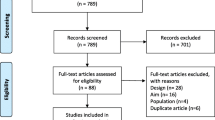Abstract
Background
Gestational Diabetes Mellitus (GDM) is a common health problem among pregnant women and may be associated with distress.
Purpose
The purpose of the study was to describe changes in patient-reported outcomes in women with GDM and identify factors associated with increased distress in these patients.
Research Design
The study was conducted in 205 women diagnosed with GDM. Study participants underwent a physical examination and completed a questionnaire two times during pregnancy. On average, the questionnaire was completed at 27 weeks of gestation at baseline and 36 weeks at follow-up. The questionnaire included socio-demographic and clinical variables, standardized patient-reported outcome measures, and questions about the impact of GDM on daily life, satisfaction with care, knowledge about GDM, and social and professional support. Our main outcome of interest was diabetes-related distress, measured by the Problem Areas in Diabetes (PAID) questionnaire. Data were analyzed using descriptive statistics and multivariable regression models.
Results
At baseline, 80 % of the women were satisfied with their diabetes care and 58 % said they managed their diabetes well. The proportion reporting little or no knowledge of GDM dropped from almost 50 % at baseline to 14 % at follow-up. However, the proportion reporting that GDM affected their social life increased from 26 to 35 %, and the proportion reporting interference with family life increased from 14 to 26 %. Insulin treatment, frequency of blood glucose measurements, lack of knowledge about GDM, and lack of support from family and health care providers were strongly and significantly associated with distress.
Conclusion
In women with GDM, intensified treatment and lack of informational and social support are associated with distress. These aspects of GDM care appear to be appropriate targets for future research and interventions aimed at reducing the level of distress in these patients.
Similar content being viewed by others
References
Buckley BS, Harreiter J, Damm P, Core Investigator Group DALI, et al. Gestational diabetes mellitus in Europe: prevalence, current screening practice and barriers to screening. A review. Diabet Med. 2012;29:844–54.
Reece EA, Leguizamón G, Wiznitzer A. Gestational diabetes: the need for a common ground. Lancet. 2009;373:1789–97.
The HAPO Study Research Group. Hyperglycemia and adverse pregnancy outcomes. N Engl J Med. 2008;358:1991–2002.
American Diabetes Association. Standards of Medical Care in Diabetes—2013. Diabetes Care. 2013;36(Supplement 1):S11–66.
Clinical recommendations (2012) Polish Diabetes Association (PDA). Available from: http://www.cukrzyca.info.pl/zalecenia_kliniczne_ptd, accessed on 28 Jan, 2013
Daniells S, Grenyer BF, Davis WS, Coleman KJ, Burgess JA, Moses RG. Gestational diabetes mellitus: is a diagnosis associated with an increase in maternal anxiety and stress in the short and intermediate term? Diabetes Care. 2003;26:385–9.
Devsam BU, Bogossian FE, Peacock AS (2013). An interpretive review of women’s experiences of gestational diabetes mellitus: proposing a framework to enhance midwifery assessment. Women Birth S1871-5192(12)00103-5
Neufeld HT. Food perceptions and concerns of aboriginal women coping with gestational diabetes in Winnipeg Manitoba. J Nutr Educ Behav. 2011;43(6):482–91.
Evans MK, O’Brien B. Gestational diabetes: the meaning of an at-risk pregnancy. Qual Health Res. 2005;15(1):66–81.
Persson M, Winkvist A, Mogren I. ‘From stun to gradual balance’—women’s experiences of living with gestational diabetes mellitus. Scand J Caring Sci. 2010;24(3):454–62.
Lawson EJ, Rajaram S. A transformed pregnancy: the psychosocial consequences of gestational diabetes. Sociolf Health Illn. 1994;16(4):536–62.
Nolan JA, McCrone S, Chertok IR. The maternal experience of having diabetes in pregnancy. J Am Acad Nurse Pract. 2011;23:611–8.
Carolan M (2012) Women's experiences of gestational diabetes self-management: a qualitative study. Midwifery S0266-6138(12)00048-4 (e-pub)
Spirito A, Williams C, Ruggiero L, Bond A, McGarvey ST, Coustan D. Psychological impact of the diagnosis of gestational diabetes. Obstet Gynecol. 1989;73:562–6.
Langer N, Langer O. Emotional adjustment to diagnosis and intensified treatment of gestational diabetes. Obstet Gynecol. 1994;84:329–34.
Lapolla A, Di Cianni G, Di Benedetto A, et al. Quality of life, wishes, and needs in women with gestational diabetes: Italian DAWN Pregnancy Study. Int J Endocrinol. 2012;2012:784726.
Trutnovsky G, Panzitt T, Magnet E, Stern C, Lang U, Dorfer M. Gestational diabetes: women’s concerns, mood state, quality of life and treatment satisfaction. J Matern Fetal Neonatal Med. 2012;25:2464–6.
WHO Consultation. Definition, diagnosis and classification of diabetes mellitus and its complications. Report of a WHO Consultation. Part 1: Diagnosis and classification of diabetes mellitus. Geneva: WHO/NSD/NCS/99.2, World Health Organization; 1999.
Zigmond AS, Snaith RP. The Hospital Anxiety and Depression Scale. Acta Psychiatr Scand. 1983;67:361–70.
Turner-Bowker DM, Bayliss MS, Ware Jr JE, Kosinski M. Usefulness of the SF-8 Health Survey for comparing the impact of migraine and other conditions. Qual Life Res. 2003;12:1003–12.
Polonsky WH, Anderson BJ, Lohrer PA, et al. Assessment of diabetes-related distress. Diabetes Care. 1995;18:754–60.
Bland M. An introduction to medical statistics. 3rd ed. Oxford: Oxford University Press; 2000.
SAS Institute Inc (2008) SAS/STAT® 9.2 User’s Guide: Cary, NC
Ogonowski J, Miazgowski T, Kuczyńska M, Krzyżanowska-Świniarska B, Celewicz Z. Pregravid body mass index as a predictor of gestational diabetes mellitus. Diabet Med. 2009;26:334–8.
Crowther CA, Hiller JE, Moss JR, McPhee AJ, Jeffries WS, Robinson JS, et al. Effect of treatment of gestational diabetes mellitus on pregnancy outcomes. N Engl J Med. 2005;352:2477–86.
International Association of Diabetes and Pregnancy Study Groups. International Association of Diabetes and Pregnancy Study Groups recommendations on the diagnosis and classification of hyperglycemia in pregnancy. Diabetes Care. 2010;33(3):676–82.
Shang M, Lin L. IADPSG criteria for diagnosing gestational diabetes mellitus and predicting adverse pregnancy outcomes. J Perinatol. 2014;34(2):100–4.
Conflict of interest
The authors report no conflict of interest.
Author information
Authors and Affiliations
Corresponding author
Rights and permissions
About this article
Cite this article
Kopec, J.A., Ogonowski, J., Rahman, M.M. et al. Patient-Reported Outcomes in Women with Gestational Diabetes: a Longitudinal Study. Int.J. Behav. Med. 22, 206–213 (2015). https://doi.org/10.1007/s12529-014-9428-0
Published:
Issue Date:
DOI: https://doi.org/10.1007/s12529-014-9428-0




